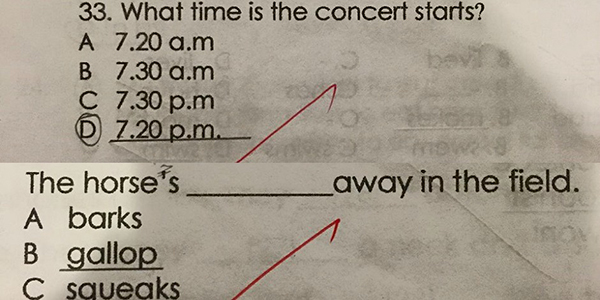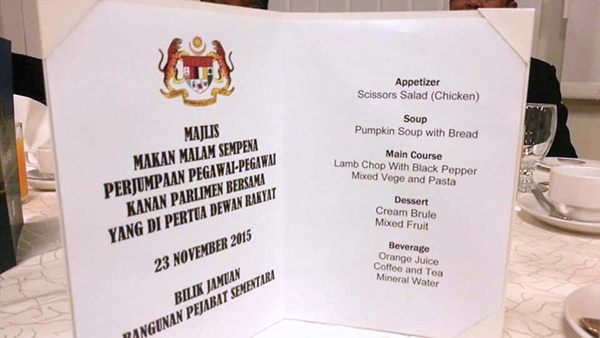
Hilarious English translation.
IT’S true Malaysians are not native speakers of English. It’s also true English contributes to the Malaysian economy. English is money … fortune.
Also, Malaysia has many people of different races. In Sarawak, there are more than 30 ethnic groups, so they speak many languages.
If you were born in Malaysia four decades ago, you would have studied English which then served as a common language for all these different groups. But if you were born a Bumiputera Malaysian today, you would study Malay and English. If you were born a Chinese Malaysian, you would study Chinese (Cantonese, Hokkien, Mandarin), Malay and English. If you were born Indian Malaysian, you would study Tamil, Malay and English.
As a result, we now have Malaysian English or Manglish which is influenced by Malaysia, China, India, Britain and local dialects.
As with many creoles, tenses and plurals are simplified, so is sentence construction. Conversely, words are added from other languages which may have no direct translation.
Some examples of Manglish are “so beautiful lah, you,” “I want to take my leave tomorrow, can or not” and “why you so like that one?”
Among many others!
While Manglish maybe an interesting lingo used by Malaysians, it can be deeply embarrassing when foreigners try their hand at it. Apparently, it’s not all about proper English usage in Malaysia nowadays. In the last few months of the previous year, several bad or awkward phrases, grammatical errors and spelling issues – in short, poor English – were spotted at public places in the country, including Sarawak. Hilarious, pathetic or shameful, how shall we describe those phrases?
Obviously, the reality before us is poor English usage is no longer uncommon in our country these days with abundant postings of it on Facebook or Whatsapp groups.
The phrase —“Welcome to the President of USA Barack Obama” – said to have been emblazoned across a DBKL electronic billboard during the recent Asean Summit in Kuala Lumpur — was among a slew that made the headlines (for the wrong reasons) late last year.
A more appropriate greeting phrase should have been “Malaysia welcomes US President Barack Obama.”
Then, in last November, Dewan Rakyat Deputy Speaker Datuk Ronald Kiandee was forced to tick off parliament staff for misspelling two appetisers which had gone viral. Scissors Salad and Cream Brule which appeared in the photograph on the menu card of a dinner event for Parliament’s senior officers with the Speaker, should rightly have been spelt Caesar Salad and Creme Brûlée.
Most would chuckle at the goof-ups, especially the Scissors Salad.

An exam question constructed with grammatical errors posted on Facebook.
Glaring grammatical errors
Even before that, the poor standard of English in the country had been brought into question when pictures of several poorly constructed English language test questions were circulated on social media. For instance, the posting on June 18 by a Facebook user revealed several multiple-choice questions that were littered with grammatical errors.
“What time is the concert starts?” was among the howlers.
Then in July the same year, more evidence of our dipping English standard was spotted when several science and maths workbooks, prescribed for students preparing for public exams in Malaysia, were found cluttered with bad grammar and usage. There are many more photos to prove poor English usage in the country spotted on the Internet. Here is one of the hilarious translations posted on a Whatsapp group. The phrase in Bahasa Malaysia — Masuk Masjid Mohon Berpakaian Rapi Dan Menutup Aurat — was translated as ‘Please Enter The Mosque Dressed And Close The Genitals’.
Concerns over our dipping English standard made headlines many times the last couple of years. Renewed calls were made to the Education Ministry to focus on beefing up proficiency in English, given that English is a global language. Many prominent figures have even suggested Malaysia should declare English language proficiency as a top priority but — with the exception of the Sarawak government — not much is being done.
Being realistic and accepting the fact that English is a universal language, Chief Minister Datuk Patinggi Tan Sri Adenan Satem in November last year decided to adopt English as a ‘preferred primary language’ of the Sarawak administration. The announcement was made at the State Civil Service Day on Nov 18.
Speaking at the 64th Sarawak Chamber of Commerce and Industry (SCCI) anniversary dinner two days later, the Chief Minister advised the people of Sarawak not to listen to pseudo-nationalists who said English is the language of Anglo-Saxons who used to colonise Malaysians.
He pointed out that using English did not amount to accepting colonisation as its main purpose is to gain access to the fields of commerce, science and technology.
Adenan said the state government will not stop using Bahasa Malaysia in its administration but will, instead, raise the levels of both the National Language and English.
The Chief Minister’s move to reintroduce Malay-English bilingualism in Sarawak had, however, aroused some criticism from so-called Malay language nationalists and advocates on national unity from Peninsular Malaysia.

Evidence of poor English spelling in Malaysia.
Honouring IGCR and MA63
While his critics can say anything they want, Adenan’s bold move is in line with the state government’s demand for autonomy as documented in both in the Inter-Governmental Committee Report (IGCR) and Malaysia Agreement 1963 (MA63).
The IGCR was the result of heavy and intense negotiations between the British, the Federation of Malaya, Sabah and Sarawak. The MA63 was the constitutional arrangements made based on whatever had been agreed in the IGCR.
Both documents are ‘conditional’ mutatis mutandis the enactment of Annex A in the MA63. They were created purposely to be beyond the reach of the Federation of Malaya or its parliament.
Any amendment to the MA63 will require the signatures of the representatives of the United Kingdom, the Federation of Malay, North Borneo, Sarawak and Singapore (which later pulled out of the Federation).
Co-Founder of the United Borneo Front and a passionate activist, promoting the Formation of Malaysia and Malaysia Agreement 1963, Zainnal Ajamain in his book — ‘The Queen’s Obligation’ — pointed out that although Education [item 13 (a) of the Federal List in the Ninth Schedule]will be of a federal subject, the present policy and system of administration of education in North Borneo and Sarawak (including their present Ordinances) should be undisturbed and remain under the control of the Government of the State until that Government otherwise agrees.
This includes, in particular:
(i)The present policy in the Borneo states that the use of English should continue;
(ii)Knowledge of Malay language should not be required as a qualification for any educational opportunity until such time as the State Government concerned considers that sufficient provision has been made to teach Malay in all schools in the State;
(iii)There should be no application to the Borneo states of any Federal requirements regarding religious education;
(iv) State provision for the special position of the indigenous peoples should continue to apply;
(v)The directors of Education in the Borneo states, who would be officers serving in Federal posts and responsible to the Federal Minister of Education through the Ministry of Education, should carry out much the same duties as they do at present in consultation with the State Government concerned.
(vi)To enable local wishes to be fully consulted and ‘taken into account as far as possible, the directors of Education of the Borneo states should continue to be advised by the respective existing Boards of Education and the local Education Committees.
Zainnal noted that in the case of Sarawak, the local authorities should continue to be used as agents for primary education and when expansion of higher education facilities was being considered by the Malaysian government, the requirements of the Borneo states should be given special consideration and the desirability of locating some of the institutions in the Borneo states should be borne in mind.
Approval from State Legislature
Meanwhile, Emeritus Professor of Law at UiTM, Shad Faruqi, recently wrote that under Article 161(3), no Act of the Federal Parliament curtailing the use of English in Sabah and Sarawak shall become law unless approved by the Legislative Assembly of these states.
It is noteworthy that the National Language Act 1963/67 which sought to promote Malay as the sole official language was never adopted by the Sarawak Assembly.
In his column in a national paper, Shad even went on to write that under Article 161(5), native languages may be used in native courts and native laws, and in Sarawak, in the state Assembly, until otherwise provided by an enactment of the State Legislature.
“Article 161E(2)(d) provides that any federal constitutional amendment, affecting the rights of Sabah and Sarawak to use any language in their states or in Parliament shall not be passed without the concurrence of each State’s Yang di-Pertua Negeri.
“Article 24(8) of the Sarawak Constitution provides that for 10 years after Malaysia Day and thereafter until the Legislature provides, all proceedings in the Dewan may be in English or native languages,” he wrote.
In addition to constitutional entrenchment, Shad pointed out that the above special safeguards for Sabah and Sarawak are also mentioned in the Malaysia Agreement 1963, concluded between the United Kingdom, Malaya, North Borneo, Sarawak and Singapore.
“Under our Federal Constitution, Article 169(c), international agreements made before Malaysia Day are binding on the government.
The Malaysia Agreement in section 61(2) allows Sabah and Sarawak to use English for any official purpose,” he said in his column.
He pointed out that Sabah replaced this by amending its Constitution to adopt Bahasa Malaysia as the official language of the State Cabinet and Assembly.
But Sarawak has never formally repudiated English and the Sarawak Assembly never adopted the National Language Act 1963/67.

This photo of a menu card of a dinner event for Parliament’s senior officers with the Speaker went viral.
